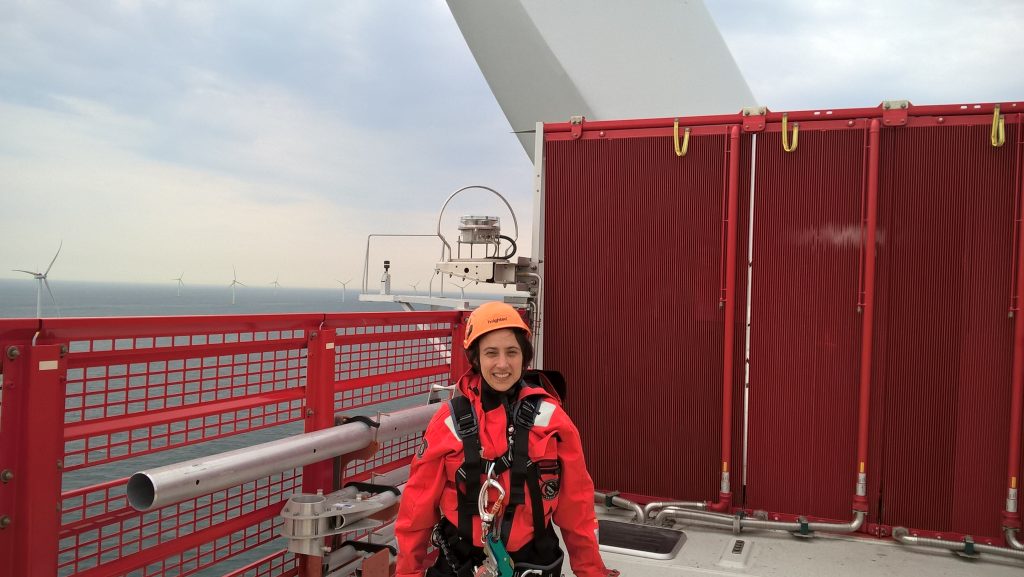What is your current position?
I have recently been promoted to Lead Interface Engineer, managing my own little team of Interface Engineers. Interface Engineering entails making sure that all the different companies working to deliver an engineering solution are working together really well.
Can you describe your typical working day as a Lead Interface Engineer?
Predominantly, I am reviewing engineering design documents, organizing interface meetings and keeping communications fluid between different companies and people contracted via email and skype. My general task is to align designs, expectations and requirements and resolve issues whenever they arise. I enjoy the combination of engineering and people interaction which is required in my role.
I am also really and looking forward to going offshore to see Triton Knoll as it is being built!
What studies have been most important in getting you into this post?
As I have been always keen on understanding the world and its physical principles I chose science courses such as maths and physics when I studied at college. They were really helpful for succeeding later in my engineering studies.
How did you get into renewable energy business and specifically offshore wind industry?
After finishing my A-levels in France and a higher education programme at a School of Engineering I moved to the UK and did a Masters degree in Ocean and Offshore Technology at Cranfield University.
At the age of 23 I finished my studies as a Marine Engineer and started in the offshore oil and gas industry as a consultant. My tasks were the improvement of risk profiles and reliability of offshore production plants. I’ve always wanted to work with the ocean environment. Renewables and especially offshore wind caught my interest during my Masters studies. From that time on, it was clear for me I wanted to end up in the offshore renewables sector. The challenge back in 2008 was that offshore renewables were a small industry in the UK with a relatively low number of available jobs, compared to the then thriving oil and gas sector. Starting my career in the oil and gas industry was a stepping stone that allowed me to apply my knowledge in Offshore Technology and build relevant experience.
Keen to enter the offshore wind sector I first joined Innogy as an Offshore Developer – while this was not a marine engineering role it was an excellent route in to a large renewable energy business. I was working on Environmental Impact Assessments (EIA), managing the exchange with the marine authorities and stakeholders in order to secure consent for construction of Triton Knoll. Later, I got the opportunity to become the Grid Development Manager, tasked with identifying potential cable routes and selecting the grid connection. This was a challenging and formative role for me.
When the Grid Connection Agreement was signed it was time for me to take a break and in 2014 I took a year off and travelled through South America. After that I got a job again with Innogy on the Galloper project, working as an Interface Engineer for the offshore substation platform (OSP), this time in the construction phase of a major offshore wind farm project. Two years, a successfully installed OSP and a baby later, I went back to an Interface Engineer role on the latest offshore construction project : Triton Knoll. Finally building a project that you have contributed to from the stage when it was just a concept is very rewarding. These projects can take up to 15 years from first inception to commissioning!
Why are you in renewables?
I am fascinated of our ability to harness the natural energy resource of the wind and turn it into clean power. Offshore technology has always been my passion. I enjoy going out on the sea from time to time and observe the progress at work.
What is the achievement in your current job you are proudest of?
| Triton Knoll
Offshore Wind Farm Limited 4th Floor, One Kingdom Street Paddington Central London W2 6BD |
Being a Lead Engineer now, I am very proud of being able to guide junior engineers and new starters and develop my own team, beside finding solutions to the different technical issues.
I feel proud to work at TK as I have seen its progress right from the start of the development phase. It is likely to be the last project of this size being constructed in such shallow water.The technical knowledge we are refining at TK will be valuable for the next-generation projects in remote water areas.
What would be your most important advice for job starters interested in offshore wind business? What qualifications should they bring?
Be interested in the technology but also in interacting with different people. Bring a lot of curiosity and motivation to bring people together and trigger solutions for problems.

